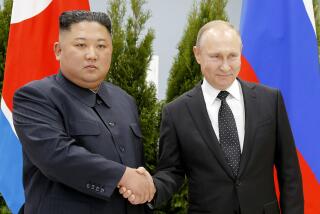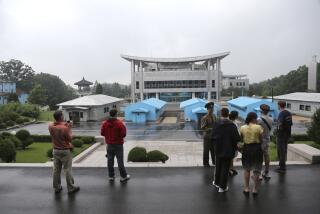Chinese Remedy for Koreas
- Share via
When Chinese soldiers crossed the Yalu River in November 1950, they fought fiercely on the side of North Korea in the war against South Korea and its U.S.-led allies. These days North Koreans cross the river in the opposite direction, into China, to escape the repressive Stalinists who have brought devastation and periodic famines on their country. The refugees create a political problem for Beijing, but one it can resolve even as it helps bring peace to the region.
So far this year, more than three dozen North Koreans have sought asylum in foreign embassies in China, hoping to reach other countries that way. (Hundreds more have reached South Korea by other means.) Despite the desperation of its citizens and an obvious need for development aid, North Korea still displays a diplomatic schizophrenia.
Last month a dozen U.S. Congress members who had been led to believe they would be admitted to North Korea arrived in Beijing, only to find the Pyongyang government would not issue them visas. The incident puts in doubt the Bush administration’s statement several weeks ago that North Korea was ready to resume talks over issues including its nuclear weapons programs.
It has been eight years since Washington brokered a deal to provide Pyongyang with two light-water nuclear reactors in exchange for shutting down two old reactors from which it was suspected of extracting plutonium that could be used for nuclear weapons. North Korea’s fits and starts in following up on the agreement and its refusal to let International Atomic Energy Agency inspectors view its facilities raise doubts about its intentions.
China could help itself, Washington and the two Koreas by leaning on North Korean leader Kim Jong Il to stop stalling new negotiations. China is North Korea’s main window to the world; Beijing’s airport is the only one with regular flights to Pyongyang, and China provided a venue for a North Korean computer show. Now China has been embarrassed by pictures of North Koreans jumping over embassy walls to seek asylum. It has balked at calling the fugitives political refugees, which would entitle them to asylum and humiliate an ally. However, it has let the defectors go to third countries en route to South Korea.
Another victim of North Korea’s obduracy has been South Korean President Kim Dae Jung. He won the Nobel Peace Prize in 2000 for his lifelong crusade for democracy in the South and his “sunshine policy” of reconciliation with North Korea. He visited the North two years ago in what he hoped would be the start of reunions between families trapped in separate halves of the Korean peninsula. But Kim Jong Il has not reciprocated. The feeling in South Korea is that Kim Dae Jung’s liberal policy is a failure, and the South should quit trying. Again, a push from China would help.
Kim Dae Jung is nearing the end of the single five-year term South Korean presidents may serve. He deserves to be remembered for helping transform South Korea from a land of authoritarian rulers to one of democracy, not as a patsy for xenophobic rulers in the north.
More to Read
Sign up for Essential California
The most important California stories and recommendations in your inbox every morning.
You may occasionally receive promotional content from the Los Angeles Times.













